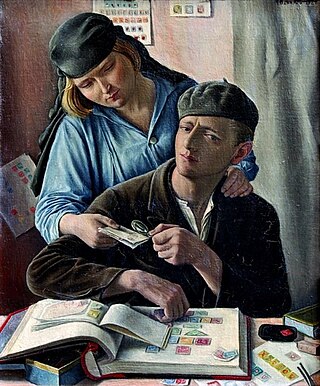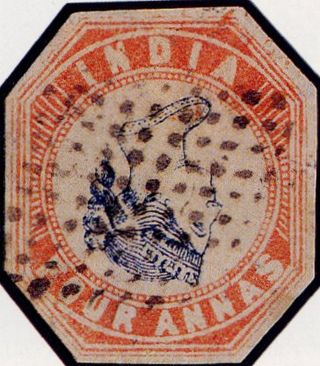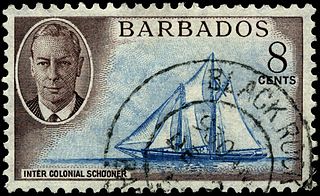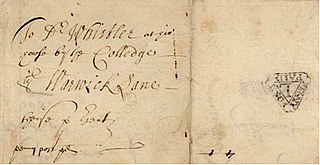| Tapling collection |
|---|
 The Tapling Collection includes this 1854, 4 annas stamp in blue and pale red from India with the error of having the head inverted. |
| Housed at | British Library |
|---|
| Curators | Paul Skinner |
|---|
The Tapling Collection of postage stamps was donated to the British Museum from the estate of Thomas Tapling in 1891. [1]
The probate value of the Tapling collection was set at £12,000 but on arrival Richard Garnett (assistant keeper of Printed Books) estimated their value at more than £50,000 and described the bequest as the most valuable gift since the Grenville Library [2] in 1847 (equivalent to £24,000,000 in 2011). [3]
It is held in the Philatelic Collections of the British Library and selected items are on permanent public exhibition. [4] [5] [6]
The collection covers the period 1840 to 1890 with some items up to 1900 added subsequently and recorded on the album pages. As of January 2009 the stamps were held in 72 boxes and the postal stationery part held in 113 albums and seven boxes. [7]

Philately is the study of postage stamps and postal history. It also refers to the collection and appreciation of stamps and other philatelic products. While closely associated with stamp collecting and the study of postage, it is possible to be a philatelist without owning any stamps. For instance, the stamps being studied may be very rare or reside only in museums.

Stamp collecting is the collecting of postage stamps and related objects. It is an area of philately, which is the study of stamps. It has been one of the world's most popular hobbies since the late nineteenth century with the rapid growth of the postal service, as a stream of new stamps was produced by countries that sought to advertise their distinctiveness through their stamps.

Postage stamps and postal history of Great Britain surveys postal history from the United Kingdom and the postage stamps issued by that country and its various historical territories until the present day.

The Inverted Swan, a 4-pence blue postage stamp issued in 1855 by Western Australia, was one of the world's first invert errors. Technically, it is the frame that is inverted, not the image of the swan, but it has become commonly known as the Inverted Swan.

The British Central Africa Protectorate existed in the area of present-day Malawi between 1891 and 1907.

Thomas Keay Tapling was an English businessman and politician. He played first-class cricket and was also an eminent philatelist who formed one of the greatest stamp collections of his era.

The Inverted Head Four Annas of India is a postage stamp prized by collectors. The 1854 first issues of India included a Four Annas value in red and blue. It was one of the world's first multicolored stamps; the Basel Dove preceded it by nine years. However, an invert error occurred during production, showing the head "upside down."

Edward Benjamin Evans, a British army officer also known as "Major Evans", was a distinguished philatelist, stamp collector, and philatelic journalist. His philatelic specialization included Mauritius, the Confederate States of America, the Mulready envelopes, and the Indian feudatory states.

Sir Edward Denny Bacon was a British philatelist who helped with the enlargement and mounting of collections possessed by rich collectors of his time and became the curator of the Royal Philatelic Collection between 1913 and 1938.

Mauritius, a small island in the southwest Indian Ocean, is important to the world of philately for a number of reasons. Its first two postage stamps issued in 1847, called the "Post Office" stamps, are of legendary rarity and value. They were the first stamps issued in any part of the British Empire outside of Great Britain. The unique cover bearing both “Post Office” stamps has been called "la pièce de résistance de toute la philatélie" or "the greatest item in all philately". The cover was sold at auction, in Zurich, on 3 November 1993, for 5.75 million Swiss francs, the equivalent of about $4 million – the highest price ever paid for a single philatelic item up to that time. In addition, Mauritius is well known for the subsequent locally produced issues known as "primitives," also prized by collectors.

This is a survey of the postage stamps and postal history of Barbados.
This is a survey of the postage stamps and postal history of British Bechuanaland.

St. Lucia a former British dependency in the Windward Islands began using stamps in 1860. It achieved Associated Statehood on 1 March 1967. In 1979, it gained independence.

The British Library Philatelic Collections is the national philatelic collection of the United Kingdom with over 8 million items from around the world. It was established in 1891 as part of the British Museum Library, later to become the British Library, with the collection of Thomas Tapling. In addition to bequests and continuing donations, the library received consistent deposits by the Crown Agency and has become a primary research collection for British Empire and international history. The collections contain a wide range of artefacts in addition to postage stamps, from newspaper stamps to a press used to print the first British postage stamps.

The Mosely Collection of British Africa stamps dating to 1935 was formed by Dr Edward Mosely of Johannesburg, South Africa. The collection was donated to the British Museum by his daughter, Kathleen Cunningham, in 1946 and is now held as part of the British Library Philatelic Collections. After the Tapling Collection, this is considered the Library's most important philatelic acquisition due to the number of countries represented and the number of unique items included.
The Universal Postal Union Collection is a deposit by the General Post Office (GPO) in the United Kingdom, under section 4 of the Public Records Act, of its duplicate Universal Postal Union collection of 93,448 stamps, covering the period from 1908.

The Crown Agents Philatelic and Security Printing Archive was deposited with the British Museum from the 1960s, though the first recorded deposit from the Crown Agents was in 1900. The archive consists of a range of philatelic and written material which were the Crown Agents' working records. It is the most comprehensive record of British Colonial and Commonwealth stamp issues of the last 100 years.
The Board of Inland Revenue Stamping Department Archive in the British Library contains artefacts from 1710 onwards, and has come into existence through amendments in United Kingdom legislation.

The Fletcher Collection is Hugh Greenwell Fletcher's lifetime philatelic collection of British postage stamps and British stamps used abroad including overprints and non-stamp items such as postal stationery. On his death in 1968, the collection was bequeathed to the Bruce Castle Museum in Tottenham, once the home of Sir Rowland Hill. The collection was donated to the British Library in 1989.

















